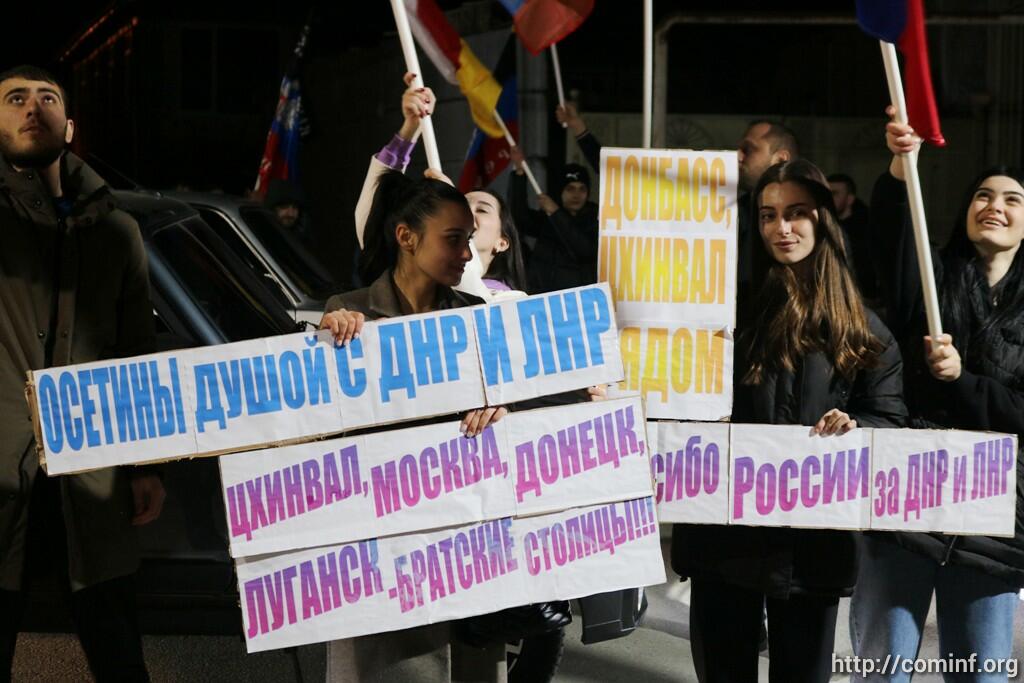
The authorities in Abkhazia, South Ossetia, and Nagorno-Karabakh have celebrated Russia’s decision to recognise separatist-controlled Donetsk and Luhansk as independent states.
Russian President Vladimir Putin recognised the separatist authorities in the two Ukrainian regions on Monday evening, ordering Russian troops to enter the regions.
Abkhazian President Aslan Bzhaniya, South Ossetian President Anatoli Bibilov, and Nagorno-Karabakh President, Arayik Harutyunyan, all hailed Russian President Vladimir Putin’s decision on Monday evening.
In a statement, Bzhaniya said that Moscow’s decision was ‘fair, based on an adequate assessment of the geopolitical reality, and in line with contemporary challenges and threats’, adding that it ‘contributes to a more just and balanced world order’.
Bzhaniya also separately congratulated the leaders of the separatist governments in Donetsk and Luhansk.
The authorities in Abkhazia also vowed to take in refugees from Donetsk and Luhansk, allocating a hotel in Sukhumi (Sukhum) to house them. According to state-run news agency Apsny Press, a delegation from the Ministry of Emergency Situations headed by Minister Lev Kvitsinia that contained two buses, an ambulance, and an ‘escort vehicle’, had already departed for Donetsk and Luhansk to evacuate people to Abkhazia.
South Ossetian leader Anatoly Bibilov said the safety of Donetsk and Luhansk was ‘guaranteed by Russia’ following their recognition. He said the decision was ‘designed to end the bloodshed, save the lives of people in the Donbas and Ukraine, and indicated open and firm support for the just struggle of the Donbas for the right to freedom, national and human dignity and peaceful labour in their native land.’

Nagorno-Karabakh’s Arayik Harutyunyan posted a congratulatory post on Facebook stating that the ‘right of nations to self-determination and to build their own state is inalienable for every people and is a fundamental principle of international law’.
Harutyunyan compared the situation in the Donbas, where Russian-backed separatists and regular Russian forces have been battling the Ukrainian Government since 2014, to the conflict between Nagorno-Karabakh and the Azerbaijani Government.
‘The Republic of Artsakh [Nagorno-Karabakh] has been fighting for its freedom, security, and state-building for decades, and has been exposed to many trials and genocidal actions. Thus, we hope that the Republic of Artsakh, which has a relevant and indisputable historical, political, legal, and moral basis, has earned international recognition as a sovereign state’.
Such recognition from Russia appears unlikely, especially considering that the day after Putin recognised the separatist governments in Ukraine, he met with Azerbaijani President Ilham Aliyev and the two signed a ‘Declaration on Allied Interaction’. The details of that document have not yet been made public.
[Read also on OC Media: Georgia raises the spectre of 2008 following Donetsk and Luhansk recognition and Armenian and Azerbaijani officials silent on Donbas recognition]
Mixed responses
Despite the enthusiastic embrace of Putin’s decision among officials in Sukhumi, Tskhinvali (Tskhinval), and Stepanakert (Khankandi), not everyone celebrated.
In Abkhazia, public figures and media commentators were largely silent after news broke of Russia’s recognition of Donetsk and Luhansk.
Abkhazian writer Elya Jikirba, criticised Russia’s actions in Ukraine while making clear that the Ukrainian government was also at fault.
‘We will also be affected here by increased pressure on [human rights]’, she wrote.
In a response to a post on Telegram channel ‘Eleanor Writes’, run by journalist Eleanorа Giloyan, one commentator suggested that the government risked creating parallels between Abkhazia and Donetsk and Luhansk.
‘Our authorities, with their welcoming statements, essentially delegitimise themselves’, he said.
Others, such as Aleksey Lomiya, a former Prosecutor General and now a popular blogger, congratulated Luhansk and Donetsk but avoided giving any assessment of the situation.
An offer by President Bzhaniya on Sunday to send military assistance to Donetsk and Luhansk was also met with scepticism.
Tigran Grigoryan, a Yerevan-based political analyst from Stepanakert, criticised Nagorno-Karabakh’s Arayik Harutyunyan’s response to events in Ukraine in a post on Facebook.
‘There must be a limit in everything. I think Arayik Harutyunyan’s congratulatory message of the recognition of the independence of Donetsk and Luhansk by Russia is wrong.’
Grigoryan argued that Armenian diplomacy should ensure that the situation in Nagorno-Karabakh was not seen as being equivalent to ‘other de facto states in the territory of the former Soviet Union’.
‘At the same time, I understand that Harutyunyan is forced to make such statements regularly, because he is probably getting some hints from officials in Moscow’, he added.
‘However, this does not mean that all Artsakh officials should take a stand on this issue. It is a very sensitive and dangerous topic that needs to be avoided as much as possible. It is not worth being more Catholic than the Pope’.
For ease of reading, we choose not to use qualifiers such as ‘de facto’, ‘unrecognised’, or ‘partially recognised’ when discussing institutions or political positions within Abkhazia, Nagorno-Karabakh, and South Ossetia. This does not imply a position on their status.









